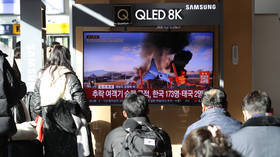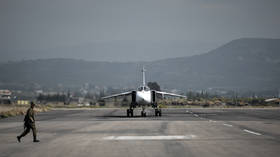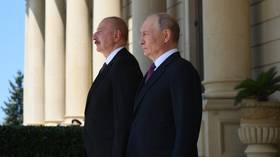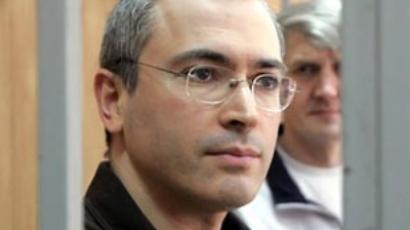Khodorkovsky gets 13.5 years' prison
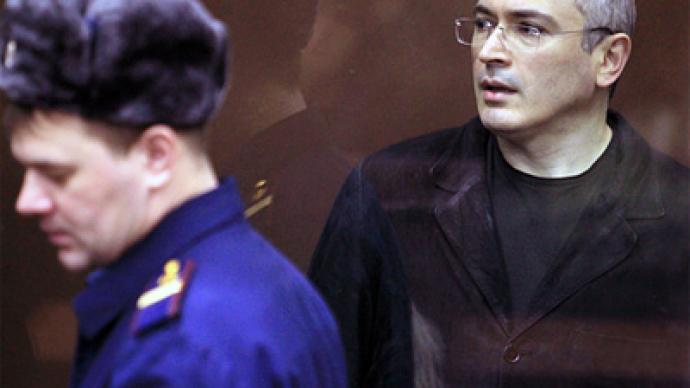
Former Yukos head Mikhail Khodorkovsky and his associate Platon Lebedev have each been sentenced to 13.5 years in prison in a second case against them.
The court has pronounced them guilty of organizing a criminal group in the oil business, embezzling 218 million tonnes of oil from Yukos’ subsidiary companies and money laundering.No more charges can be brought against them over this case. The new sentence is concurrent with the original one, meaning that the time already served would be deducted from the new term. In 2004, in the first case against him, Mikhail Khodorkovsky was sentenced to eight years in prison. The term comes to end in 2011.A lawyer for Khodorkovsky, Yury Shmidt, has called the sentence “unlawful and not based on proof.” He said the judgment will be appealed.
Verdict provisions
The reading of the verdict started at about 11am Moscow time (8am GMT) on December 27 at the capital's Khamovnichesky Court. After pronouncing the men guilty of misappropriation of assets, Judge Viktor Danilkin said that the men have also been found guilty of registering off-shore companies “to facilitate criminal business activities.”As for Yukos' oil extraction subsidiaries, Uganskneftegaz, Tomskneft and Samaraneftegaz, the judge said they were initially put in “economically unfavorable conditions”, in which they had no opportunity to run their own business activities. The court also established that Khodorkovsky and Lebedev only returned part of the profits to these companies.Money-laundering from oil misappropriation was carried out through “complicated contracts abroad and on the domestic market”.“Taking out oil from Samaraneftegaz, Tomskneft and Uganskneftegaz, selling it on cut prices, concealing information necessary for the financial statements breach not only Russian law, but also international standards,” the verdict reads.In an attempt to hide the misappropriation, the court found Khodorkovsky, Lebedev and other members of the criminal group had made fake purchase and sales deals through front companies.Platon Lebedev has been found guilty of organizing financial transactions in the affair.According to the verdict, Yukos had double-entry bookkeeping and to conceal this fact, the company’s reports were only published in English on the official Yukos website. Khodorkovsky’s lawyer Vadim Kluvgant said that the court’s conclusion is not logical, as the very fact of the publication speaks for itself and has nothing to do with an attempt to conceal the information. The judge said that Khodorkovsky and Lebedev had a thought-out plan for all these crimes and they acted in accordance with it. The court has considered dozens of minutes from general meetings of Yukos subsidiaries, which confirm this charge.The defendants have also been found guilty of actively bribing shareholders and top mangers of Yukos-affiliated companies, who were out of their control and could hamper their plans. The money for the bribes was taken from the accounts of foreign front companies, the verdict says.Despite the fact that Khodorkovsky and Lebedev pleaded not guilty, the court has found their evidence “contradictory” and taken it “critically”, the judge said.According to the court findings, the defendants cheated the auditing company PricewaterhouseCoopers (PwC), providing false financial statements to them. During the process, Khodorkovsky’s and Lebedev’s defense repeatedly pointed out that PwC concluded that Yukos’ financial statements were transparent and trustworthy. The court has established that Khodorkovsky and Lebedev committed all the crimes “for the purpose of personal enrichment.”
Evidence unfounded
“The court considers the proof provided by the prosecution grounded and makes them the basis of the verdict,” Judge Viktor Danilkin announced on Thursday. However, the evidence given by former Russian Prime Minister Mikhail Kasyanov and former head of the Central Bank, Viktor Gerashchenko, was dubbed by the court as baseless. At the hearings, Kasyanov said that it was not possible to steal the amount of oil incriminated to Khodorkovsky and Lebedev. As for Gerashchenko, he called accusations of oil misappropriation “nonsense”. He also said that auditors revoked their reports under pressure from the prosecution.During the process former Minister for Economic Development Herman Gref also testified in court. He said Gref he did not have any information about the stealing of oil. This evidence was also rejected by the judge as unsubstantiated.As for the testimony by Khodorkovsky himself in his defense, the court concluded that it, on the contary, proves his guilt.
Also read Nikolay Svanidze's and Vladimir Mamontov's columns on the issue
Journalists obstructed
Journalists covering the reading have filed a complaint with the Federal Service of Court Ushers saying that they have faced obstacles reporting the news. In an open letter to the head of the service, the group of journalists said that ushers in the Khamovnichesky Court have imposed rules on them that are not stipulated in a single document regulating journalistic work in court.Journalists have regularly faced rude treatment and had to listen to “unflattering judgments concerning actual persons,” the letter says.Television reporters have also had problems while talking live to camera.
Inside and outside the court
There has been no live broadcast in a special room for journalists. It is only possible to listen to the verdict in the courtroom, which does not have enough seats for all those wanting to witness the event.“The fact that the broadcast was stopped at the beginning of the reading is a very meaningful symptom for justice,” Karina Moskalenko told journalists. “Even if hearings are held behind closed doors, the reading of the verdict should be public. Otherwise, this places the judge beyond public control,” she added.Also, on the first day after a 15-minute break in the middle of the reading, even those journalists that were in the court room at the beginning were not allowed in again.Overall, about 30 representatives of the print media and a limited number of Russian and foreign television channels are allowed in the court room.On Monday Mikhail Khodorkovsky’s wife Inna was removed from the court room. Interfax has reported that ushers demanded she leave as she was talking during the reading of the verdict.On the same day police detained at least 12 activists who rallied outside Khamovnichesky court for refusal to wrap up banners they brought with them. Officers reportedly resorted to using force to detain the protesters. The activists were shouting “down with the police state”.
“Not guilty” – Khodorkovsky
On December 15, the reading of the verdict in the second criminal case against Khodorkovsky and Lebedev was postponed until the end of month. Both businessmen are serving their first eight-year prison term after they were found guilty in 2005 of fraud and tax evasion.Khodorkovsky, the former Yukos company head, was Russia’s richest man before he was arrested in 2003. Prosecutors demanded 14 years in prison for him and his business partner Lebedev in the second criminal case. During the second trial that has lasted 19 months, prosecutors accused Khodorkovsky and Lebedev of embezzling 218 million tons of oil from Yukos’ subsidiary companies. Khodorkovsky said his actions were legal. He claimed that the prosecution had not managed to prove their position. The businessmen have always insisted on their innocence. Last month Khodorkovsky said before the court, “My principles are worth my life.” Prosecutors said the charges against both defendants “have been substantiated.” They also claim they had asked for “a lesser punishment for the defendants” in accordance with new amendments regarding economic crimes.


